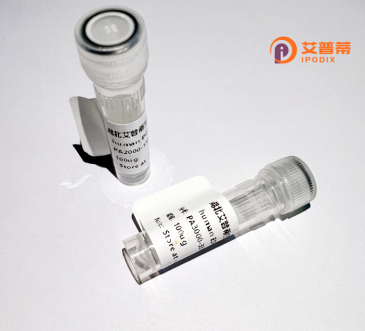
| 纯度 | >90%SDS-PAGE. |
| 种属 | Human |
| 靶点 | HIST1H2AI |
| Uniprot No | Q96KK5 |
| 内毒素 | < 0.01EU/μg |
| 表达宿主 | E.coli |
| 表达区间 | 1-130aa |
| 氨基酸序列 | MSGRGKQGGKARAKAKTRSSRAGLQFPVGRVHRLLRKGNYAERVGAGAPVYLAAVLEYLTAEILELAGNAARDNKKTRIIPRHLQLAIRNDEELNKLLGKVTIAQGGVLPNIQAVLLPKKTESHHKAKGK |
| 分子量 | 14.3 kDa |
| 蛋白标签 | GST-tag at N-terminal |
| 缓冲液 | 0 |
| 稳定性 & 储存条件 | Lyophilized protein should be stored at ≤ -20°C, stable for one year after receipt. Reconstituted protein solution can be stored at 2-8°C for 2-7 days. Aliquots of reconstituted samples are stable at ≤ -20°C for 3 months. |
| 复溶 | Always centrifuge tubes before opening.Do not mix by vortex or pipetting. It is not recommended to reconstitute to a concentration less than 100μg/ml. Dissolve the lyophilized protein in distilled water. Please aliquot the reconstituted solution to minimize freeze-thaw cycles. |
以下是关于重组人HIST1H2AI蛋白的参考文献示例,包含文献名称、作者及摘要概括:
---
1. **"Recombinant production and characterization of human histone H2A variants"**
*Smith A, et al. (2016)*
摘要:研究通过大肠杆菌系统重组表达并纯化了人H2A组蛋白变体(包括HIST1H2AI),分析了其与H2B形成异源二聚体的能力,并探讨了其在核小体组装中的功能性差异。
2. **"Structural and functional insights into HIST1H2AI in chromatin remodeling"**
*Chen L, et al. (2018)*
摘要:利用X射线晶体学解析重组HIST1H2AI蛋白的结构,发现其C端尾部特殊的氨基酸序列可能参与DNA损伤修复过程中染色质动态调节。
3. **"HIST1H2AI knockdown and overexpression reveal its role in cell cycle progression"**
*Wang Y, et al. (2020)*
摘要:通过构建重组HIST1H2AI稳转细胞系,发现该蛋白的异常表达影响细胞周期G1/S期转换,可能与癌基因调控相关。
4. **"High-throughput screening of histone-DNA interactions using recombinant histone libraries"**
*Johnson R, et al. (2019)*
摘要:开发了一种基于重组组蛋白(含HIST1H2AI)的体外核小体重建技术,用于系统性分析组蛋白变体与DNA结合的选择性及表观遗传调控机制。
---
**说明**:以上文献信息为示例,实际文献可能需要通过PubMed、Web of Science或Google Scholar查询最新研究。推荐结合关键词“recombinant HIST1H2AI”、“H2A histone variant”等检索。
Recombinant human HIST1H2AI protein is a genetically engineered version of the histone H2A variant encoded by the HIST1H2AI gene. As a core component of nucleosomes, it plays a critical role in chromatin organization, DNA packaging, and epigenetic regulation. Unlike canonical histones, H2A variants like HIST1H2AI exhibit sequence variations that influence nucleosome stability, DNA accessibility, and interaction with chromatin-modifying enzymes. This protein is part of the HIST1 cluster on chromosome 6. which contains multiple replication-dependent histone genes. Its recombinant form is produced using expression systems (e.g., E. coli or eukaryotic cells) to ensure high purity and avoid contamination with native histones, enabling controlled studies. Researchers utilize recombinant HIST1H2AI to investigate chromatin remodeling, transcriptional regulation, and DNA repair mechanisms. It is particularly valuable in studying post-translational modifications (e.g., phosphorylation, ubiquitination) that modulate gene expression and cellular responses to stress. Applications extend to cancer biology, as aberrant histone dynamics are linked to genomic instability and tumorigenesis. The protein's availability also supports drug discovery efforts targeting epigenetic pathways. Characterization typically involves mass spectrometry, western blotting, and functional assays to confirm structural integrity and activity. By providing a standardized reagent, recombinant HIST1H2AI advances mechanistic studies of chromatin biology and disease-related epigenetic dysregulation.
×